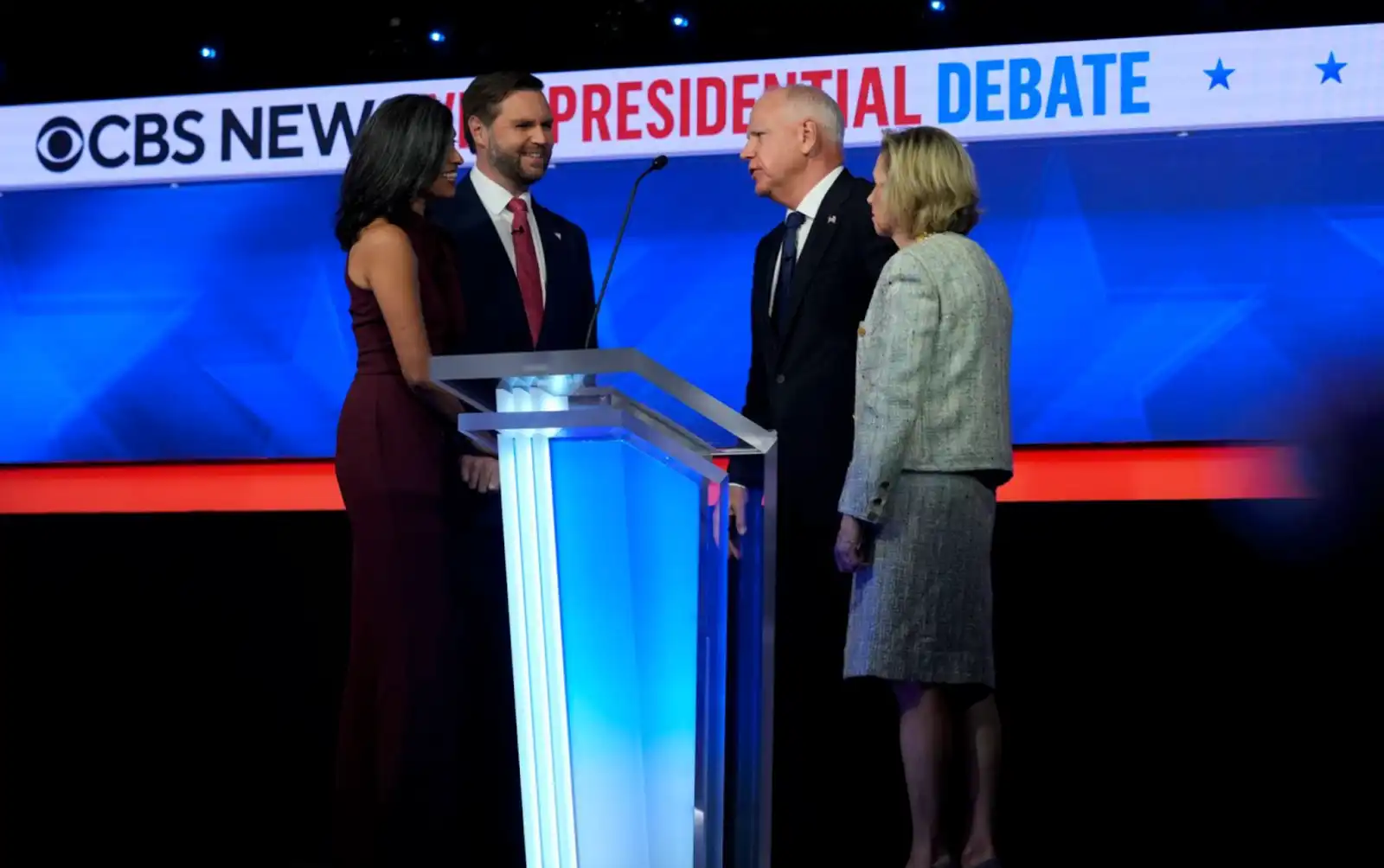2024 Vice Presidential Debate: Echoes of Political Norms Past
Tim Walz and J.D. Vance offered a rare flash of traditional political discourse, bringing policy focus to an otherwise chaotic political era.

Photo by Matt Rourke/AP
I, like many Americans, feel disillusioned by our current political climate. The polarization, the unsatisfying choices of candidates, and the uncertainty of the country’s future seem to have reached their peak with the looming 2024 election. It’s exhausting to be amid the volatile, high-octane cycles that occur every four years. But this time, tuning into the Vice Presidential debate, I didn’t feel the emotional intensity I anticipated—in fact, I found myself almost bored.
To be fair, Vice Presidential debates rarely influence election outcomes. They are more about reinforcing each party’s base and showcasing how their ticket plans to govern. Based on recent history—think the Harris vs. Trump debate—I expected nothing short of personal attacks, interruptions, and that trademark lack of middle ground. The news media certainly did nothing to temper those expectations, promoting the debate in a way that suggested we were in for more of the same political theater.
At first, my prediction held up as Tim Walz and J.D. Vance kicked off the debate with a heated exchange about a question regarding Israel and a possible preemptive strike on Iran. But soon enough, that initial intensity gave way to a surprisingly slow-paced, detailed discussion. The two candidates set aside their opening jabs and spoke cordially, even finding points of agreement on issues like manufacturing jobs going overseas and the ongoing national debate about abortion. There was even a sort of truce when it came to misquoting each other’s past statements—rather than seize those opportunities for easy attacks, they chose to focus on presenting their policies.
“I’m going to be careful with the quotes…”
Tim Walz addressing a quote from J.D. Vance
It was both refreshing and monotonous. I appreciated the calm and deliberate tone, a departure from the explosiveness we’ve all been conditioned to expect. But at the same time, the lack of high drama made me realize just how much of that volatility has become ingrained in our political discourse. Yet, this gave them more room to discuss policies—something I think matters most. The debate offered a rare opportunity to hear actual specifics, something that was largely absent in the 2024 Presidential Debate.
I can’t deny the “character” component in these races. As much as policy matters, presidential elections are still a contest of popularity. It’s an inescapable aspect of politics overall: winning votes requires persuasion, and for many, that’s tied to personality as much as to policy. Consider Trump, whose voter base has stayed firm in their support of him. Regardless of controversies Trump has undergone, whether that be his trials, incitement of the events of January 6th, or his less than perfect policy record, supporters are still loyal to him. The reason for such support can be seen during the VP debate. The common ground between Walz and Vance sometimes felt forced, and their discussions of reforms—whether on taxes or education—often drifted into ambiguity. Both candidates strayed far from their actual running mate’s claims, talking about how “things need to be done better,” with no clear roadmap to how to do so. Their almost centrist tones didn’t align with the much sharper distinctions between their respective presidential candidates, which created a sense of disingenuousness. As a result, voters still feel misinformed about what to expect, and tend to focus on more simple factors like character to guide their decision making.
Ultimately, the debate reinforced what seems to be becoming less critical, that being well-informed discussion and well-informed audiences. So much of our political discourse—especially in debates—is overshadowed by character attacks and superficial drama. When policy is discussed, it often feels like posturing. That’s why moments like this are a call to action for all of us to become more politically sensible. We need to be more knowledgeable, not just about the policies we agree with, but also about those we oppose or don’t fully understand. By that extension, we should consider those who deem trust in political candidates based on character. Whether or not I agree with that premise, there’s probably a reason that people do that. Tim Walz and J.D. Vance, through their largely civil discourse, showed us a model for how we should engage in political conversation—not just as candidates but as citizens in a democracy.